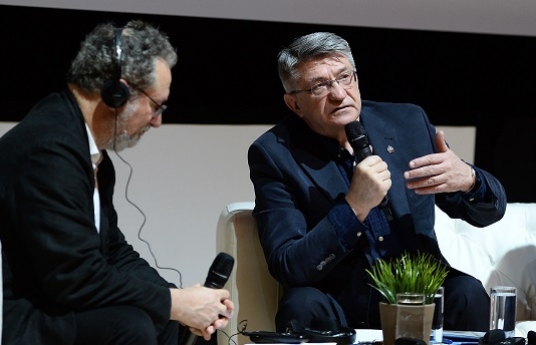Qumra Master Aleksandr Sokurov challenges typical notions of cinema to inspire young filmmakers to push boundaries
Mar 09, 2016

Masterclass by Sokurov urges filmmakers to learn all aspects of cinema
Doha, Qatar; March 8, 2016: The masterclass by Russian auteur Aleksandr Sokurov at Qumra defied conventions at many levels: He did not have pompous words of advice for emerging filmmakers nor did he offer many learning from his own experience as a director.
Instead, he challenged conventions during the candid discussion in which, more than once, he questioned the credentials of cinema as an art form, and chose to describe directors as “repeating, borrowing, stealing, observing and adopting,” from all other forms of art.
Sokurov, a modern master, whose film Russian Ark was shown in the Modern Masters Screening at Qumra to a packed audience, described the elaborate preparation that went into the single, 90-minute shot film. And that took to give one parting counsel for filmmakers: “You will have to know everything about the making of a film or you will not be able to guide your crew and get what you want from them.”
A deep understanding of all aspects of cinema was called in during the making of Russian Ark, for which even special computers were built, said Sokurov.
Unequivocal in stating that cinema must be “blamed for many things in life today,” he described literature as his own guiding force, especially Fyodor Dostoyevsky’s Crime and Punishment. He said he felt repulsion at the mix of crime and genius, and wanted to protest against the author.
That is why he continues to resist violence in cinema stating he would prefer not to watch creepy, violent movies even if the filmmakers behind them are extremely talented. “For me, the ethical, spiritual side of death is more important – as a human being and director. There is no reason to romanticise violence, war or death.”
Recalling his association with legendary director Andrei Tarkovsky, with whom he shared a deep connection, Sokurov spoke at length about how they used to disagree over films, with Tarkovsky challenging Sokurov’s admiration for Federico Fellini’s movies. “No one had ever paid attention to me like he did … no one, not before or not after I met him.”
Sokurov called Tarkovsky “a gift to the film industry” and said he considers it as a privilege and blessing to have known Tarkovsky. “Deep down, he had tremendous trust in himself. He considered himself as a genius. Even on his death-bed, he had that unwavering confidence in himself that God will not give him to death.”
Personally, Sokurov believes that film is not an art form that can generate a masterpiece. “Literature, yes. Music, yes. But never ever in films. Films are what I would call ‘present continuous.’ They never finish.” That is why he does not mind going back to his earlier films and relentlessly editing and trimming them.”
Sokurov said the many components of film were already perfected by geniuses before. “Ernest Hemingway – he is the real master-editor; Mozart – principles of harmony and symphony were created by such geniuses. Films steal from them.”
Celebrating the power of literature, Sokurov, who has adapted works of literature to film, said his ideal moment is when after the screening of a film, the audience goes to the library to read more by the author. “I support freedom, and a person is free only when he or she reads. When you read a book, you create in your images in your mind but the moment you watch it on cinema, the fantasy you create is destroyed.”
His own rule in adapting works of literature is not to confront the writer. “Literature and film are like the snake and the bird. Which is better – crawling or flying? The snake would say crawling; the bird and man would say flying. Cinema is a snake; literature is a bird. There is nothing more important than to make a human being read a book.”
Sokurov said that mainstream American cinema looks only for the social motivation of the characters or plot in a film. To him, what is more important is the moral motivation and the importance of “sincerity, honesty and openness” in his characters. He discussed how he attempts to unravel with his films the moment when men turn to the other side, the circumstances that lead him to it.
Following an excerpt from his 2007 film ‘Alexandra’ he discussed working with actress and opera singer Galina Vishnevskaya saying, “she possesses power, force and graciousness and I think these are the characteristics of the Russian people.”
He closed by discussing the dilemma for writers: “There is nothing in cinema; you turn on a projector and you turn it off. That is it. The dilemma for every writer is how to end a film. The closing parts of the film are the most important. They represent the reason why you make the film and how you finish it is a huge question because life goes on.”
He said he is delighted to be in Qatar, which presents him with an opportunity to understand the region and Islamic art in its true essence.
During Qumra, Sokurov will be mentoring filmmakers whose projects are participating in an intensive development programme including: writer-director Noor Al Nasr’s The Pearl; director Marin DiCicco and producer Kakha Macharashvili of The Silk Rail Road; writer-director Oliver Laxe, producer Felipe Lage and co-producer Lamia Chraibi of The Mimosas; and producer-director Tamara Stepanyan and producer Nathalie Combe of Those From the Shore.
Sokurov is one of five Qumra Masters at the event – the others are screenwriter, director and leading US indie producer James Schamus; Turkish auteur and Cannes Palme d’Or and Grand Prix winner, Nuri Bilge Ceylan; Japanese writer/director Naomi Kawase and two-time Academy Award nominated US documentarian Joshua Oppenheimer.